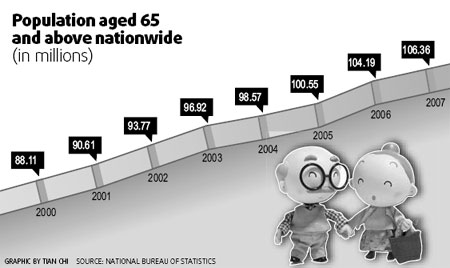
Zhu Hangmei, director of the retirement home, said people always ask her when a bed will be available.
"I have to disappoint them very often," she said.
Gui Shixun, vice-president of the Shanghai Association of Gerontology, said that most seniors' homes, except luxury and expensive ones, are full. "The percentage of beds that can accommodate old people that needs intensive care is also low," he said.
"It is often the situation that there will be a bed available only when someone dies."
Zhu admitted that her retirement home does not accept people that are in poor health - considered a common practice in most retirement homes in the city.
"To solve the problems of an aging population, we still have to depend on families and communities," Gui said.
"I would suggest old people who are able to take care of themselves stay at their own homes, leaving beds at retirement homes for those who are most in need of them."
To plug the gaps from rising demand, the city government has been building more neighborhood facilities and community services.
From 2005, several neighborhoods in downtown Xuhui, Putuo and Jing'an districts began providing meals to senior residents at affordable prices. About 135,000 senior citizens in Shanghai's 210 neighborhoods can currently have such meals at neighborhood canteens.
At the Jing'an Temple neighborhood, senior citizens pay 300 yuan a month to cover all their meals and 100 yuan more for services such as laundry, bathing and massaging. Those who are too weak to leave their homes can get home-care services.
More than 120 day-care centers and 5,000 game rooms have also been built for the elderly.
A plan by the authorities aims to have 90 percent of the city's permanent residents aged above 60 living at home, 7 percent staying at home and going to neighborhood day-care centers and 3 percent of the group living in retirement homes, by 2010.
By that time, the number of beds in the city's retirement homes is also expected to hit 100,000.
With such day-care services by then, old citizens like Wang Zhende and Ren Zeru, who go to retirement homes because they are unable to arrange meals on their own, will probably choose to stay home instead, Zhu Hangmei said.